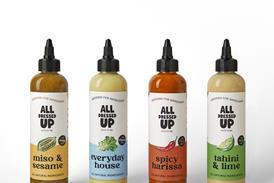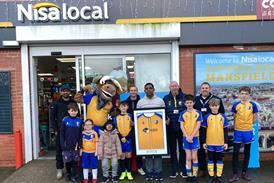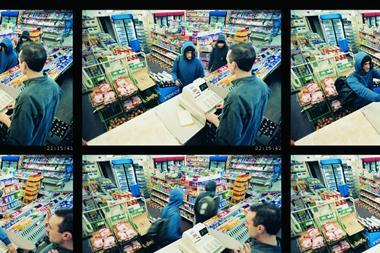How do you ensure that your staff take health and safety issues seriously?
Malcolm: We give staff an induction when they first start. We also have posters dotted around the building warning of potential hazards, so healthy and safety is always front of mind.
Simon: My staff are very efficient - over the years we've drummed it into them and they pass the message to new recruits.
Lionel: It's all about continuous training. One of our staff is an officer in St John Ambulance and trains the rest of the staff.
Atul: We had an audit a couple of years ago to make sure staff knew what they were doing. There's a standard practice in place and if they don't follow it, then they know it'll just add to their workload. For example, if you don't clean up a smashed wine bottle immediately, the liquid will spread under a shelf and clearing it up will become a much tougher job.
What is the correct procedure if a member of staff is taken ill while they are at work?
Malcolm: It rarely happens, but if it does then we treat each case individually. Obviously, if someone is too poorly to work then we send them home.
Simon: If it's a virus, then we tell them to go home - you have to see sense with issues such as this as you don't want any illness to pass through your whole workforce.
Lionel: The first thing we'd do is just sit them down. If it's a headache it might fade, but if it's something more serious then they would probably be sent home to recover.
Atul: It comes down to basic logic. If it's something infectious and everyone catches it, then that's much worse, so it's best to send someone home. I trust my staff to be honest with me and, where possible, to arrange cover.
Is there too much red tape involved in health and safety issues?
Malcolm: My immediate reaction is to say yes, but if you asked me which part of the regulation should be removed, then I couldn't tell you. I suppose the fact is that it is an area which is time-consuming, but necessary.
Simon: Yes - some things are just silly, such as the rules surrounding lifting heavy objects. Different people can lift different weights, so it's not the kind of area where you can have set boundaries.
Lionel: No, I don't think there is. As long as you deal with the person in need before doing the paperwork, then I don't have a problem with the regulations.
Atul: There is a lot of red tape, but it's a necessary evil and when it comes down to it, it's for your own safety.
How should you treat a customer who is taken ill in your store?
Malcolm: If someone feels a bit faint, then we've been known to sit them down on a stool and, if they're really sick, we'll even give them a lift back home. It's really up to the customer - some people don't appreciate too much attention as they get embarrassed.
Simon: If someone falls unconscious, we try to keep them still in the recovery position and call an ambulance.
Lionel: I had a lady who fell ill in the store, so I sat her down and called an ambulance straightaway. She was going in and out of consciousness and I sat with her until the paramedics arrived.
Atul: I let a staff member who is trained in first aid look after the customer as best they can and assess the situation.
How should retailers deal with a member of staff who injures themselves at work?
Malcolm: We have a duty of care by law. With that in mind, any injuries have to go into the accident book.
Simon: They're a pretty sensible bunch, so there aren't many injuries. But if someone does hurt themselves, it should go into the accident book and the employee would be seen by a first-aider.
Lionel: It's best to report it in the accident book. If I'm ever in doubt when it comes to treating an injury, I ring the NHS helpline for advice.
Atul: We have a first-aid box, so if a member of staff has burnt themselves, then they'll patch themselves up using that.
What kind of a record do you keep when accidents occur?
Malcolm: You write down what the injury is and how it occurred - it's important to keep a record.
Simon: We write down the time and date of the accident and a report of what happened. Recording these incidents in an accident book can help to back you up if something is taken to court.
Lionel: It's a case of writing down the details of what happened and why, so that you can learn from it.
Atul: If there was a major accident then all details about what the injury is and what led to it would be logged.
Do you encourage staff to report accidents, no matter how minor?
Malcolm: My staff have to use the accident book, whatever the injury, because we need to show due diligence.
Simon: Yes, certainly - even just a cut on the finger needs to be reported.
Lionel: Yes, you need to know everything about your business, so that you can do something to stop the accident happening again - prevention is better
than cure.
Atul: You're supposed to log everything, but I let my staff make the call on whether the injury warrants a full report or not. If the injury just something like a minor burn, then doing a full write-up just adds to the employee's workload, so I don't force them to do it.
How important is it to train your staff in first aid?
Malcolm: We have 50 staff, so we don't train all of them in first aid, but we do have a number of staff who are trained.
Simon: It's important that staff feel confident enough to handle a situation. I'm a trained first-aider and so are a couple of others. To be honest, most of my staff know the basics and those who work in the deli area know how to deal with cuts and burns.
Lionel: It's critically important because you never know when those skills will come into play.
Atul: It's always handy to have one member of staff per shift who is trained in first aid.
How much time do you spend on health and safety issues?
Malcolm: Quite a bit - we regularly carry out hazard analysis and get regular visits from health and safety inspectors. It's always at the back of your mind that something could happen, so I make it a priority to maintain a safe working environment.
Simon: I don't have to spend too long on health and safety because all my staff are well aware of the issue. It's more often when
you're training new people
that you have to hone in on health and safety.
Lionel: It's something that's part of our business, so it's an ongoing issue. For example, it would be very easy to allow your medication to go out of date as you might not use it for a few years, so it needs to be checked every six months.
Atul: I don't spend as much time on health and safety as I'd like to, but that's just the way it goes.
Who do you find is a good source of advice for health and safety issues?
Malcolm: The government
has a good health and safety website (www.hse.gov.uk) and Spar produces useful material, but a lot of it comes down to common sense. It's all very well having a general health and safety policy, but you have to tailor it to your own store. For example, there could be an awkward step that poses a potential hazard and you have to be the one to spot it and alert other people to it.
Simon: Most of our queries go to the local councillors and environmental health officers.
Lionel: Our St John Ambulance staff member keeps us up-to-date with any health and safety news. St John are very helpful and can offer training to retailers. The trade press is also a great source of information and the NHS helpline is extremely useful.
Atul: Musgrave is always on hand to offer advice, and auditors can also answer your questions
Malcolm: We give staff an induction when they first start. We also have posters dotted around the building warning of potential hazards, so healthy and safety is always front of mind.
Simon: My staff are very efficient - over the years we've drummed it into them and they pass the message to new recruits.
Lionel: It's all about continuous training. One of our staff is an officer in St John Ambulance and trains the rest of the staff.
Atul: We had an audit a couple of years ago to make sure staff knew what they were doing. There's a standard practice in place and if they don't follow it, then they know it'll just add to their workload. For example, if you don't clean up a smashed wine bottle immediately, the liquid will spread under a shelf and clearing it up will become a much tougher job.
What is the correct procedure if a member of staff is taken ill while they are at work?
Malcolm: It rarely happens, but if it does then we treat each case individually. Obviously, if someone is too poorly to work then we send them home.
Simon: If it's a virus, then we tell them to go home - you have to see sense with issues such as this as you don't want any illness to pass through your whole workforce.
Lionel: The first thing we'd do is just sit them down. If it's a headache it might fade, but if it's something more serious then they would probably be sent home to recover.
Atul: It comes down to basic logic. If it's something infectious and everyone catches it, then that's much worse, so it's best to send someone home. I trust my staff to be honest with me and, where possible, to arrange cover.
Is there too much red tape involved in health and safety issues?
Malcolm: My immediate reaction is to say yes, but if you asked me which part of the regulation should be removed, then I couldn't tell you. I suppose the fact is that it is an area which is time-consuming, but necessary.
Simon: Yes - some things are just silly, such as the rules surrounding lifting heavy objects. Different people can lift different weights, so it's not the kind of area where you can have set boundaries.
Lionel: No, I don't think there is. As long as you deal with the person in need before doing the paperwork, then I don't have a problem with the regulations.
Atul: There is a lot of red tape, but it's a necessary evil and when it comes down to it, it's for your own safety.
How should you treat a customer who is taken ill in your store?
Malcolm: If someone feels a bit faint, then we've been known to sit them down on a stool and, if they're really sick, we'll even give them a lift back home. It's really up to the customer - some people don't appreciate too much attention as they get embarrassed.
Simon: If someone falls unconscious, we try to keep them still in the recovery position and call an ambulance.
Lionel: I had a lady who fell ill in the store, so I sat her down and called an ambulance straightaway. She was going in and out of consciousness and I sat with her until the paramedics arrived.
Atul: I let a staff member who is trained in first aid look after the customer as best they can and assess the situation.
How should retailers deal with a member of staff who injures themselves at work?
Malcolm: We have a duty of care by law. With that in mind, any injuries have to go into the accident book.
Simon: They're a pretty sensible bunch, so there aren't many injuries. But if someone does hurt themselves, it should go into the accident book and the employee would be seen by a first-aider.
Lionel: It's best to report it in the accident book. If I'm ever in doubt when it comes to treating an injury, I ring the NHS helpline for advice.
Atul: We have a first-aid box, so if a member of staff has burnt themselves, then they'll patch themselves up using that.
What kind of a record do you keep when accidents occur?
Malcolm: You write down what the injury is and how it occurred - it's important to keep a record.
Simon: We write down the time and date of the accident and a report of what happened. Recording these incidents in an accident book can help to back you up if something is taken to court.
Lionel: It's a case of writing down the details of what happened and why, so that you can learn from it.
Atul: If there was a major accident then all details about what the injury is and what led to it would be logged.
Do you encourage staff to report accidents, no matter how minor?
Malcolm: My staff have to use the accident book, whatever the injury, because we need to show due diligence.
Simon: Yes, certainly - even just a cut on the finger needs to be reported.
Lionel: Yes, you need to know everything about your business, so that you can do something to stop the accident happening again - prevention is better
than cure.
Atul: You're supposed to log everything, but I let my staff make the call on whether the injury warrants a full report or not. If the injury just something like a minor burn, then doing a full write-up just adds to the employee's workload, so I don't force them to do it.
How important is it to train your staff in first aid?
Malcolm: We have 50 staff, so we don't train all of them in first aid, but we do have a number of staff who are trained.
Simon: It's important that staff feel confident enough to handle a situation. I'm a trained first-aider and so are a couple of others. To be honest, most of my staff know the basics and those who work in the deli area know how to deal with cuts and burns.
Lionel: It's critically important because you never know when those skills will come into play.
Atul: It's always handy to have one member of staff per shift who is trained in first aid.
How much time do you spend on health and safety issues?
Malcolm: Quite a bit - we regularly carry out hazard analysis and get regular visits from health and safety inspectors. It's always at the back of your mind that something could happen, so I make it a priority to maintain a safe working environment.
Simon: I don't have to spend too long on health and safety because all my staff are well aware of the issue. It's more often when
you're training new people
that you have to hone in on health and safety.
Lionel: It's something that's part of our business, so it's an ongoing issue. For example, it would be very easy to allow your medication to go out of date as you might not use it for a few years, so it needs to be checked every six months.
Atul: I don't spend as much time on health and safety as I'd like to, but that's just the way it goes.
Who do you find is a good source of advice for health and safety issues?
Malcolm: The government
has a good health and safety website (www.hse.gov.uk) and Spar produces useful material, but a lot of it comes down to common sense. It's all very well having a general health and safety policy, but you have to tailor it to your own store. For example, there could be an awkward step that poses a potential hazard and you have to be the one to spot it and alert other people to it.
Simon: Most of our queries go to the local councillors and environmental health officers.
Lionel: Our St John Ambulance staff member keeps us up-to-date with any health and safety news. St John are very helpful and can offer training to retailers. The trade press is also a great source of information and the NHS helpline is extremely useful.
Atul: Musgrave is always on hand to offer advice, and auditors can also answer your questions
How would you deal with a customer who is angry after injuring themselves in your store?
Malcolm: You have to defuse the situation and be as tactful as you can. You can apologise for their distress, but don't put yourself in a position of liability if it's not your fault - people will trip on their own shoelaces and try to blame you if you're not careful!
Simon: I had a lady who slipped on the floor and ripped her blouse. It wasn't our fault - the shopfloor was dry and her shoes were just wet from outside, but we replaced her blouse out of goodwill.
Lionel: You should act the same as when you are in a selling situation. You have to listen to the customer, which generally allows their anger to subside. Apologise that the injury has happened and show sympathy, but don't admit liability.
Atul: At the end of the day, the customer might have every right to be angry, but that won't solve the problem, so it's best to stay calm and treat them as you would like to be treated (although never accept blame).
Malcolm: You have to defuse the situation and be as tactful as you can. You can apologise for their distress, but don't put yourself in a position of liability if it's not your fault - people will trip on their own shoelaces and try to blame you if you're not careful!
Simon: I had a lady who slipped on the floor and ripped her blouse. It wasn't our fault - the shopfloor was dry and her shoes were just wet from outside, but we replaced her blouse out of goodwill.
Lionel: You should act the same as when you are in a selling situation. You have to listen to the customer, which generally allows their anger to subside. Apologise that the injury has happened and show sympathy, but don't admit liability.
Atul: At the end of the day, the customer might have every right to be angry, but that won't solve the problem, so it's best to stay calm and treat them as you would like to be treated (although never accept blame).
What is the most testing health and safety incident you have had?
Malcolm: A couple of years ago a man passed out in the store and cracked his head open. I've never seen anything like the amount of blood that was on the floor - it was terrible! Our first-aider put him in the recovery position and called an ambulance. Luckily, the man made a full recovery.
Simon: It was probably when a lady fell over in the store and ripped her blouse. I was concerned because there was a chance that she would want to take matters further.
Lionel: A lady fainted in our shop and it was clearly serious, so we called 999. The woman ended up having a heart attack in the ambulance on the way to the hospital. Thankfully, she made a full recovery and even came into the shop to thank us for saving her life through our prompt action.
Atul: We had a woman collapse on the pavement outside the store. Sadly, she passed away, but our first-aider made her last hours as comfortable as possible.
Malcolm: A couple of years ago a man passed out in the store and cracked his head open. I've never seen anything like the amount of blood that was on the floor - it was terrible! Our first-aider put him in the recovery position and called an ambulance. Luckily, the man made a full recovery.
Simon: It was probably when a lady fell over in the store and ripped her blouse. I was concerned because there was a chance that she would want to take matters further.
Lionel: A lady fainted in our shop and it was clearly serious, so we called 999. The woman ended up having a heart attack in the ambulance on the way to the hospital. Thankfully, she made a full recovery and even came into the shop to thank us for saving her life through our prompt action.
Atul: We had a woman collapse on the pavement outside the store. Sadly, she passed away, but our first-aider made her last hours as comfortable as possible.























No comments yet